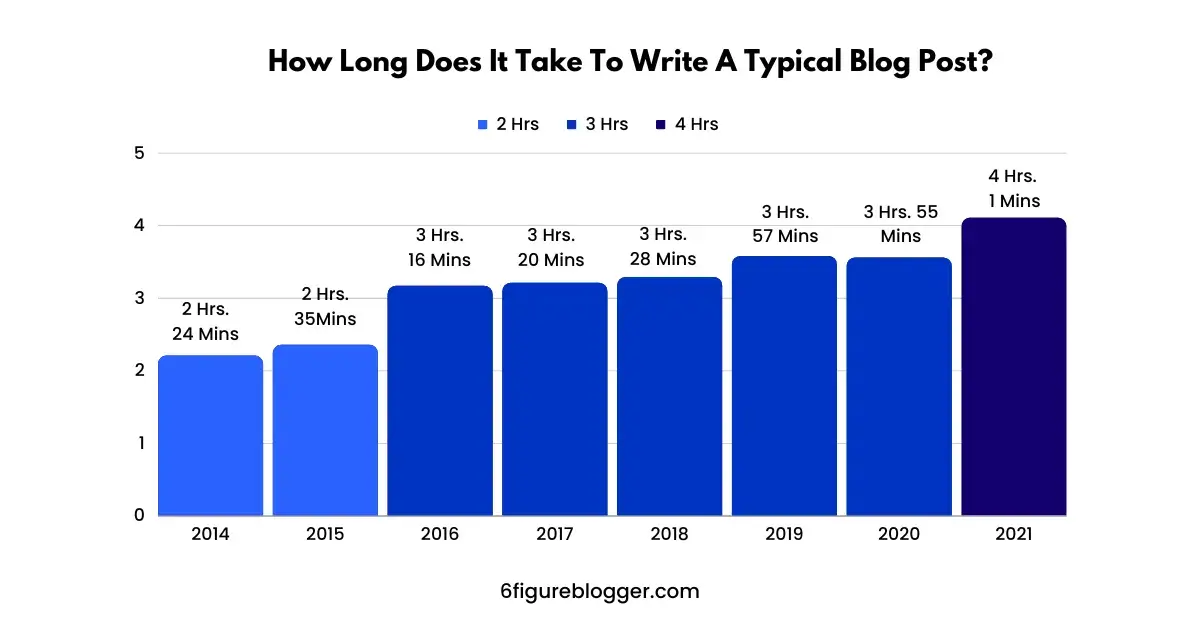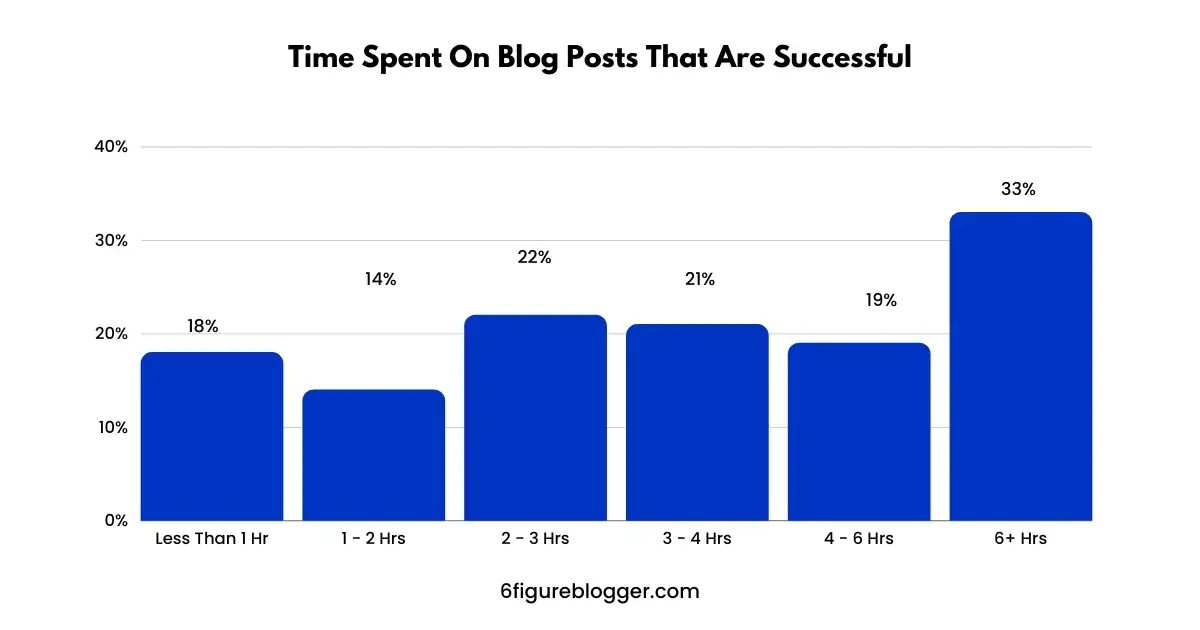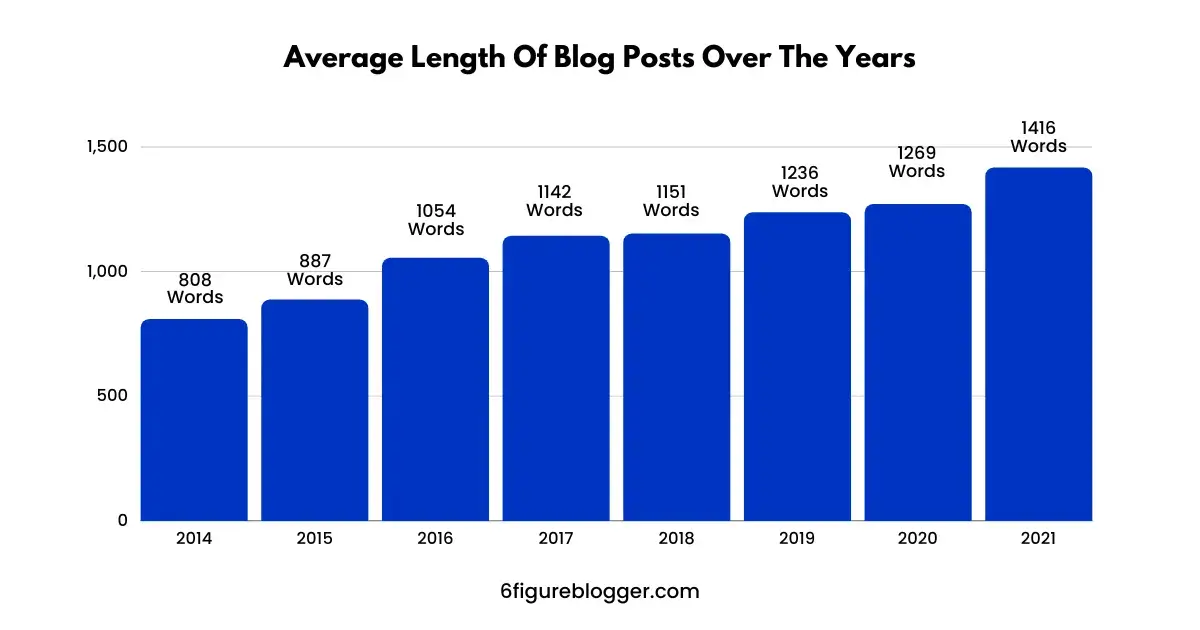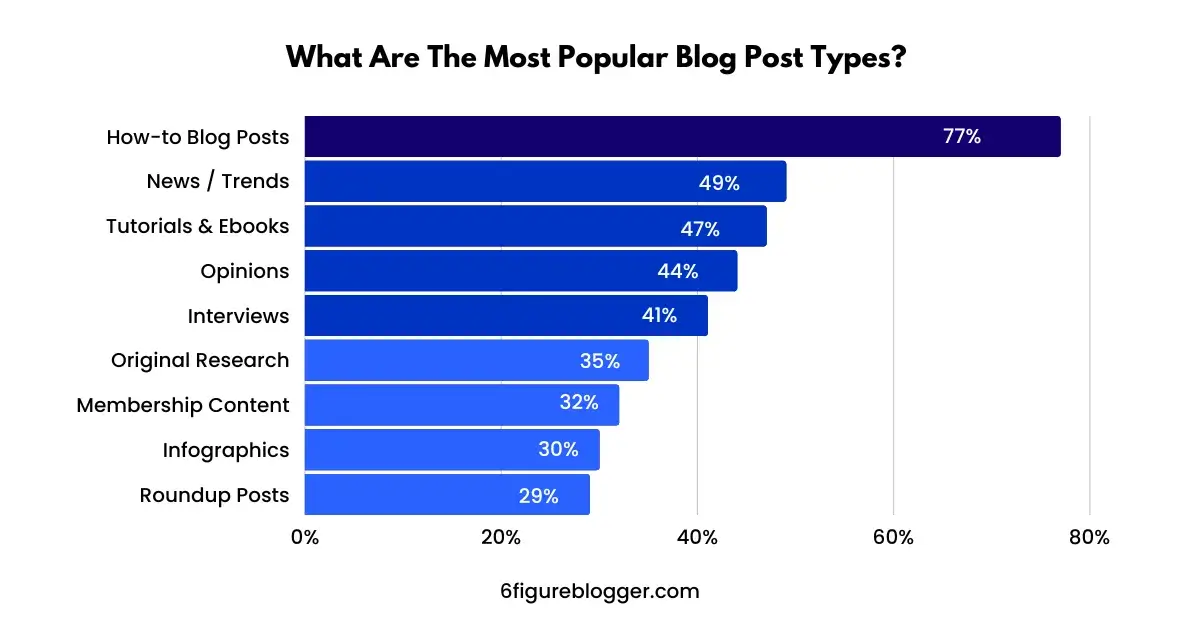I may get a paid commission for purchases made after clicking a link in this post, click here to read my disclosure.
Just how long should a blog post be? what is the acceptable length of blog posts?
how do you know you are writing blog posts that are too short or blog posts that are too long?
In this blog post,
We will be diving deep into the real statistics behind blog post lengths and the current status of Google’s recent core updates,
and how it affects blog post lengths and quality, if you are ready…here we go.
According to a survey by Orbit Media,
Google started to favor long-form content over short or thin content over the years because it is believed that a longer blog post would cover a specific topic in a more in-depth and comprehensive way than a shorter blog post would.
Hence the recent obsession over long-form content,
since providing a comprehensive blog post with great images and infographics as well as videos that help to drive your point home can take a really long time to produce,
It leaves one wondering….how long is long?….
Blog Post Length Statistics 2022
A 2021 survey showed that the average time bloggers spend writing a blog post increased by a significant amount in 2021 since the top 3 ranking blog posts appearing for a good number of keywords were more than 2000+ words long in the search results.

Due to this reason,
Bloggers are now spending more time creating and curating content that will be more useful to their target audience,
This helps to reduce the bounce rate and boost the EAT (Expertise, Authoritativeness, and Trust-Worthiness) of a website in the eyes of Google.
An average of 4 hours spent on writing a blog post allows you enough time to research your post, draft an outline, create click-worthy titles and sub-titles and write create a blog post that your readers will love and appreciate.

More than 33% of bloggers who spent 6-plus hours drafting and creating a blog post claim that their blog post was successful and brought them the most traffic, conversions, and in turn, income.
This is because the additional time was allocated to other activities as well such as researching for long tail keywords where that particular website had a real chance of ranking, adding LSI keywords and phrases, and creating blog posts that appeal to readers, not just search engines.
How long should blog posts be in 2022?
The answer is simple,
the length of every blog post is relative to the topic being covered, in other words,
If a topic could be covered in as little as 10 paragraphs comprehensively, there isn’t really any need to prolong it just for the single purpose of “writing long-form content” to please search engines in the name of SEO.
Remember that you are writing for human beings and not machines, people actually have to read your content and find it helpful for you to become an authority or expert in your niche.

An ideal blog length is any length that satisfactorily answers a user’s search query in as many words as required,
A recent study showed that the length of blog posts keeps increasing every single year.
The average length of blog posts ranking on page one of Google has one thing in common,
They all have a minimum of 2000 words and all contain keywords that users are constantly typing into the Google search bar.
Depending on your audience and your niche, the length of your blog post may vary, since different topics determine the length of the content you need to create for it.
Does blog length affect SEO?
Blog post length does not affect blog SEO, The most important aspect of content length when it comes to SEO is how comprehensive the blog post is and the amount of unique value it provides in comparison to other blog posts out there on the same topic.
Using this point of view,
The skyscraper technique would be better for creating blog posts in such a way that the content is 10 times better than any other currently existing content on the same topic.
Create content that is 10 times better than your competitors by creating content with demonstrative images, tutorial videos, and even going ahead to attach guides or links to external resources that your readers might find helpful.
Do short blog posts work?
Short blog posts cannot cover a topic in a very in-depth way that is usually required for a reader to properly understand the topic or answer a question comprehensively.
You want to check out the currently existing posts in the topic ranking on page 1 or 2 of Google and determine their average length,
Let’s say that the average length of the blog posts is 1500 words, you don’t want to write a blog post of 300 words.
That completely kicks you out of the competition as you are more likely to produce less comprehensive content than what already exists.

So far, the most popular kinds of blog posts are “how to blog posts”,
They account for about 77% of the traffic to most websites, followed immediately by current news or trends and tutorials, and eBooks.
Depending on your blog niche, the type of content you create may vary,
But it is wise to incorporate “how-to posts” into your content strategy as this can significantly boost your blog traffic.
How do you write a successful blog post?
To write a successful blog post, you need to take the following into account;
1. Focus On Your Target Audience
According to Google’s 2022 helpful content update, websites or blogs that didn’t have a clear target audience or readership group could hardly produce helpful content,
This is because there isn’t any way to create content that would be helpful to a certain group of people if you don’t even know who those people are.
Defining a clear target audience for your blog helps you to know more about what kind of content your target audience is searching for and then proceed to create content that would satisfactorily answer their questions.
This all boils down to choosing a specific niche and focusing on growing your knowledge and expertise in that particular niche instead of focusing on 4 or 5 niches all at once on the same website, in other words being a jack of all trades and master of none.
2. Write About What Your Readers Are Searching For
The best way to draft the perfect content for your readers on your blog is to get out there and talk with them,
Ask them questions about their current problems, what issues they are facing, and what would be most helpful for them.
At the end of the day,
If your blog post is about 3000 words but in no way covers the issues your target audience is facing or solves their problems,
Then you have achieved nothing by creating that blog post.
This is where platforms like Quora and Reddit come in,
They are really great for helping you get in touch directly with your target audience and uncover millions of questions that they are asking every single day and things that they really need help with instead of making it up as you go along.
3. Update Your Content Often
To make sure that your readers keep coming back to your blog and that you are proving the best content possible,
You want to make sure that it is grammatical errors and repetition free,
By constantly updating and editing your content, you provide fresh and updated tips that your readers will appreciate.
It’s sad to visit a website and find that most of the advice or tips given there are all tips from 7 years ago that no longer work in the current year,
A good way to tackle this issue would be to keep a tracker of all your blog posts and their date of publishing and then update your blog posts yearly or as frequently as required depending on your blog niche.
4. Create Attention-Grabbing Headlines Using Your Keywords
No matter how great your blog posts are and how long,
You would achieve nothing if you cannot get it to rank on the search engines and get the eyes of your target audience on your content.
This is where SEO comes in, there are so many SEO practices for bloggers that would help your content rank higher in the search results, and most importantly,
get it clicked on when it is displayed in the search results.
Make sure that you are constantly using tools like Coschedule headline analyzer to draft really cool blog post headlines that contain your focus keywords and that your readers can’t help but click on in the SERPs.
5. Write A Really Great Into
The best part of any good blog post is the introduction, if your introduction sucks,
Chances are that your readers will lose interest before they get to the middle of the page,
You want to make sure that you are able to quickly grab the attention of the reader in as very few words as possible.
Attention is fickle,
This is why you have to make sure that right up in the first paragraph of your blog post you are giving the reader a lot of valid reasons as to why they should keep reading your blog post instead of clicking out.
6. Space Out Your Post & Avoid Repetition
Nobody likes a blog post that is long and looks like a wall of death!
It will throw off anybody’s attention and make them rush to click the exit button,
To avoid this, make sure that you are correctly formatting your blog posts by following the correct grammatical syntax for the language that you are writing on and that you are also spacing out your text.
Use proper headers for at least every 300 words and be careful not to go off topic from what you are currently writing about,
Use bullet points and numbered lists when necessary to ensure that your writing is neat and inviting to the reader.
Here’s a list of helpful tools like Grammarly for editing your content properly
What makes a good blog article?
A good blog article is one that is;
- Written for the specific target audience.
- Is at least 1000 words long.
- Very quick and easy to read.
- Contains information that the user finds useful and interesting.
- Shows expertise and authority in the topic which they are writing about.
- Has a great title that grabs the reader’s attention while scrolling.
- Has a great opening statement or paragraph.
- Is SEO optimized to the rank of different search engines?
- Includes a call to action that compels the readers to take action after reading it.
Ideal Blog Post Lengths For Different Blog Post Types
Depending on the type of blog post you are writing, the advised length will vary,
Here are a few of the most popular blog post types and the suggested length for each one;
How long should pillar pages be?
Standard blog posts usually cover 500 to 2000 words, pillar blog posts which are more in-depth usually have a minimum of 5000 to a maximum of 10,000 words.
It should cover a broad topic in a more in-depth way but also be able to link out to shorter blog posts on the same topic that can’t be covered after the blog post has exceeded 10,000 words
Since pillar blog posts are usually the most important blog posts on your websites,
They need to be ones that grab attention and be long enough to keep the readers on your website for some time and not let them bounce right off your blog because your blog post is too long.
How long should list blog posts (listicles) be?
Listicles or List blog posts should be anywhere from 2,200 to 2,600 words long.
They are blog posts that contain a list of answers the reader is directly searching for, each specific item on the list is broken into a subheading in the blog post,
These types of articles do not necessarily require you to go in-depth on a specific topic
Because you can always link out to other blog posts that cover each topic in your list in a more in-depth way that the readers can understand.
How long should “how-to” blog posts be?
A good how-to blog post should be anywhere from 1500 words to 2,500 words to cover a tutorial guide in a very in-depth and comprehensive way.
A “How to” blog post is more of a guide or tutorial on how to do a specific thing,
Now depending on the topic that the tutorial is about, then the length of your how-to blog post will vary from blogger to blogger and topic to topic.
How long should “what is” blog posts be?
A good “what-is” blog post should be anywhere from 1200 words to 1800 words if it is to be able to comprehensively answer the question being asked.
The “what-is” blog post is a blog post that answers a searcher’s question in a way that is satisfactory and comprehensive to the reader,
It is directly designed to answer a searcher’s question directly by explaining further in simpler terms.
To achieve this goal,
Without making the blog post appear too long or too short for the reader.
Minimum Blog Post Length
Regardless of the type of blog post that you are writing, the minimum blog post length for any kind of blog post is 300 words,
Any blog post containing less than 300 words would have a hard time ranking in the search results as it would be seen as not comprehensive or poorly written.
Since Google believes that it would take more than 300 words to be able to provide a substantial answer or blog post of value that the user will find helpful and unique,
You want to make sure that the majority of the articles on your website ate above the 300-word mark.
Conclusion – Don’t Focus On The Number Of Words!
When it comes to producing high-quality content on a consistent basis that will be helpful to the reader,
Your primary focus should not be on the number of words that makes the blog post look in-depth and helpful.
Your focus should be on creating content that will actually be helpful to your target audience,
Answer questions that they might have in your blog posts, link out to helpful resources and guides, and provide cheat sheets, ebooks, and other helpful material that you know that they might need and
If possible take a step further and create a video tutorial because people find it easier to remember a video they watched than an article they read.
Create the best possible content on the topic so that your readers can’t help but see you as an expert or even better,
The best source of any information that they need on a specific topic, niche, or industry.

